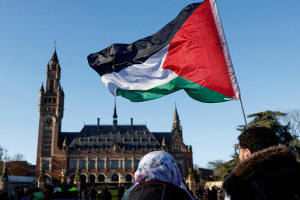At World Court, Palestinians demand end of Israeli occupation
 Send a link to a friend
Send a link to a friend
 [February 19, 2024]
By Anthony Deutsch and Stephanie van den Berg [February 19, 2024]
By Anthony Deutsch and Stephanie van den Berg
THE HAGUE (Reuters) -Palestinian Foreign Minister Riyad al-Maliki on
Monday demanded an immediate end to Israel's occupation of the
Palestinian territories at the start of hearings on the legal status of
the disputed land at the United Nations' top court.
More than 50 states will present arguments before the International
Court of Justice (ICJ) in The Hague until Feb. 26, following a 2022
request from the U.N. General Assembly for an advisory, or non-binding,
opinion on the occupation.
Israeli leaders have long disputed that the territories are formally
occupied on the basis that they were captured from Jordan and Egypt
during a 1967 war rather than from a sovereign Palestine.
Al-Maliki accused Israel of subjecting Palestinians to decades of
discrimination and apartheid - accusations Israel has rejected - arguing
that they had been left with the choice of "displacement, subjugation,
or death".
"The only solution consistent with international law is for this illegal
occupation to come to an immediate, unconditional and total end," he
said.
The judges are expected to take several months to deliberate before
issuing their opinion.
Israel has ignored such legal opinions in the past, but this one could
increase political pressure over its war in Gaza, which has killed about
29,000 Palestinians, according to Gaza health officials, since Hamas
attacked Israel on Oct. 7.

Israel captured the West Bank, Gaza and East Jerusalem - areas of
historic Palestine which the Palestinians want for a state - in the 1967
conflict. It withdrew from Gaza in 2005, but, along with neighboring
Egypt, still controls its borders.
'MORAL, POLITICAL AND LEGAL IMPERATIVE'
The hearing is part of Palestinian efforts to get international legal
institutions to examine Israel's conduct. These have stepped up since
Israel's war on Gaza in response to the Hamas attacks, which killed
1,200 people, according to Israeli tallies.
Al-Maliki reiterated accusations of Israeli genocide in Gaza which
Israel firmly rebuffed at separate hearings in The Hague last month.
"The genocide underway in Gaza is a result of decades of impunity and
inaction. Ending Israel's impunity is a moral, political and legal
imperative," al-Maliki said.
Israel has said it faces an existential threat by Hamas militants and
other groups and is acting in self-defense.

[to top of second column]
|

Protesters hold a Palestinian flag as they gather outside the
International Court of Justice (ICJ) as judges rule on emergency
measures against Israel following accusations by South Africa that
the Israeli military operation in Gaza is a state-led genocide, in
The Hague, Netherlands, January 26, 2024. REUTERS/Piroschka van de
Wouw/File Photo

There are mounting concerns about an Israeli ground offensive
against the Gaza city of Rafah, a last refuge for more than a
million Palestinians after they fled to the south of the enclave to
avoid Israeli assaults.
It is the second time the U.N. General Assembly has asked the ICJ,
also known as the World Court, for an advisory opinion related to
the occupied Palestinian territory.
In July 2004, the court found that Israel's separation wall in the
West Bank violated international law and should be dismantled,
though it still stands to this day.
Judges have now been asked to review Israel's "occupation,
settlement and annexation ... including measures aimed at altering
the demographic composition, character and status of the Holy City
of Jerusalem, and from its adoption of related discriminatory
legislation and measures."
Among countries scheduled to participate in the hearings are the
United States - Israel's strongest supporter, China, Russia, South
Africa and Egypt. Israel will not, although it has sent written
observations.
Since 1967, Israel has greatly expanded Jewish settlements in the
West Bank - an action Palestinians say compromises the creation of a
viable Palestinian state. It has also annexed East Jerusalem in a
move not recognized by most countries.
The General Assembly also asked the ICJ's 15-judge panel to advise
on how those policies and practices "affect the legal status of the
occupation" and what legal consequences arise for all countries and
the United Nations from this status.
The advisory opinion proceedings are separate from the genocide case
that South Africa filed at the World Court against Israel for its
alleged violations in Gaza of the 1948 Genocide Convention. In late
January the ICJ in that case ordered Israel to do everything in its
power to prevent acts of genocide in Gaza.

The outcome of the advisory opinion would not be legally binding but
would carry "great legal weight and moral authority," according to
the ICJ.
(Reporting by Anthony Deutsch, Stephanie van den Berg and Dan
Williams; Editing by Angus MacSwan, Michael Perry and Philippa
Fletcher)
[© 2024 Thomson Reuters. All rights reserved.]This material
may not be published, broadcast, rewritten or redistributed.
Thompson Reuters is solely responsible for this content. |